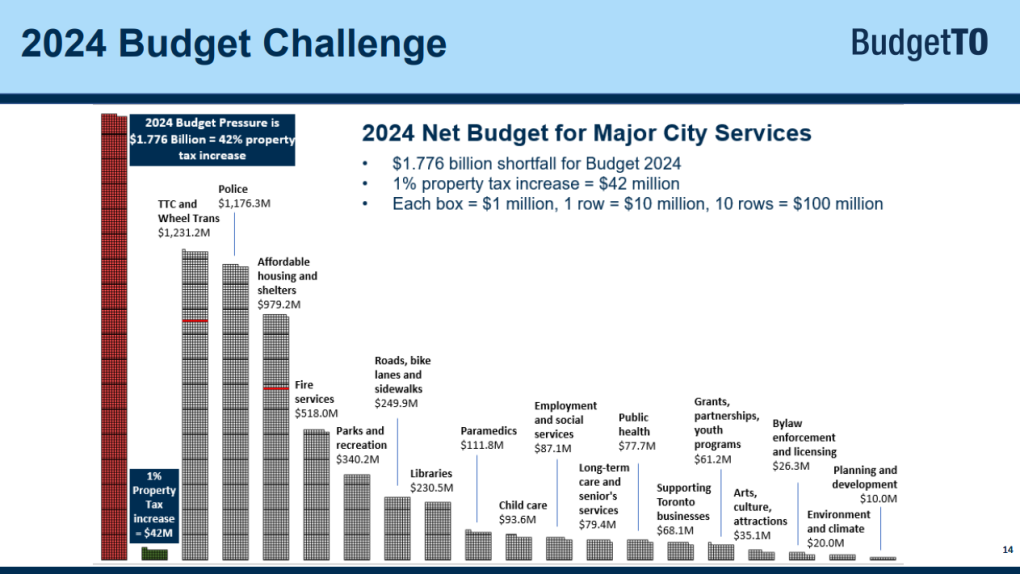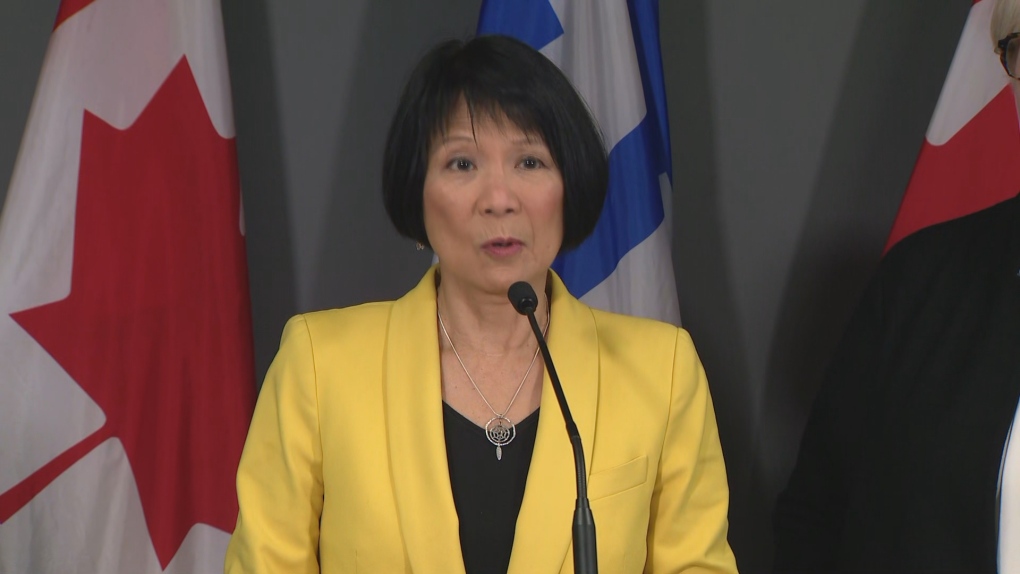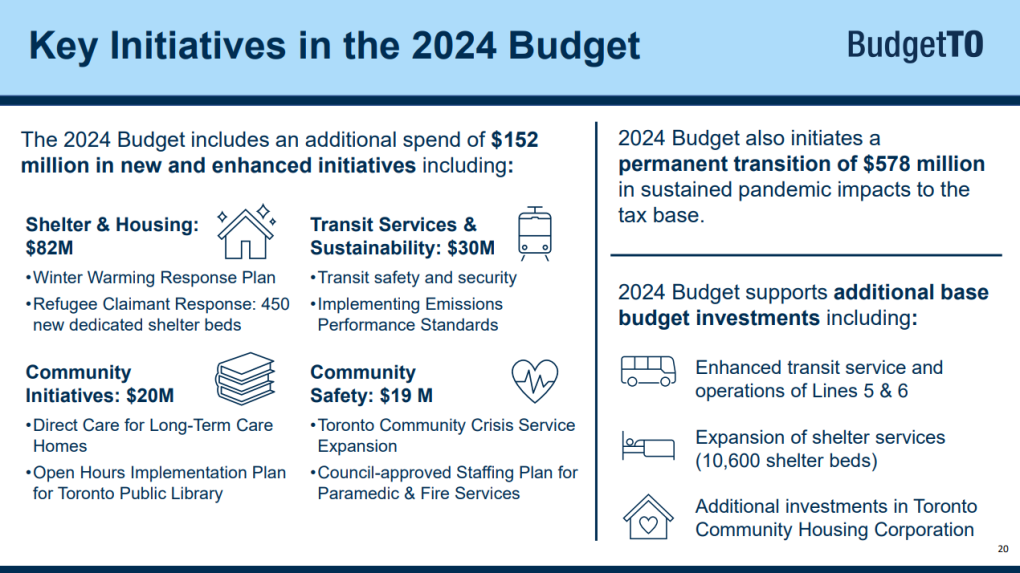Toronto homeowners to see 10.5 per cent tax bump under Olivia Chow's first proposed budget
The first proposed budget of Mayor Olivia Chow’s tenure includes a 10.5 per cent property tax increase, one of the largest the city has seen in years, as Toronto struggles to make up a persistent deficit.
“Our roads are crumbling and our public transit needs serious improvements. Thousands of people are sleeping in shelters, parks and on the street. The city is failing to provide the basics…We have to get the city back on track and we have to fix the things that are broken and the financial mess,” Chow said at a news conference Wednesday afternoon.
- Download our app to get local alerts on your device
- Get the latest local updates right to your inbox
Budget Chief Shelley Carroll announced the proposed tax rate ahead of a meeting of the Budget Committee Wednesday.
The rate includes a nine per cent property tax increase, as well as a 1.5 per cent bump to the city building fund. It will mean an increase of around $360 a year for the average household in Toronto, Carroll said.
"It's no secret that this is going to be a challenging financial year," Carroll told reporters.
"Six months ago, we inherited a budget shortfall of one and a half billion resulting from years of underinvestment and unpredictable partnership from other orders of government with additional pressures continuing throughout 2023, particularly in our shelter system," she said. "That shortfall now sits at just below $1.8 billion. I feel strongly that we cannot keep kicking that can down the road. We need to get our city back on track."
 The scope of Toronto's $1.776-billion budget shortfall is illustrated in this graph presented on Jan. 10, 2024. (City of Toronto)
The scope of Toronto's $1.776-billion budget shortfall is illustrated in this graph presented on Jan. 10, 2024. (City of Toronto)
The proposed tax increase comes even after city staff found over $600 million in cost savings and cost avoidances for the 2024 budget year "through sound financial management," Carroll said.
Chow thanked city staff for their work on Toronto’s 2024 spending strategy, but underscored “this is not the final budget” and that the budget committee will now review the plan amid a second round of public consultations before she presents her version of the fiscal plan on Feb. 1.
“I will introduce my budget, the mayor's budget. It will reflect what we've heard and it will come to city council for final decision on February 14,” she said, adding that the city has already heard from more than 11,000 Torontonians in the first round of public outreach.
According to Carroll, this is the first time in 15 years that public consultations have been held before the rate was decided.
Toronto has been struggling to right its finances amid dragging losses from the COVID-19 pandemic as well as high inflation that has driven up costs.
The city is now grappling with a confirmed operating budget shortfall of nearly $1.8 billion, up from a previous projection of $1.5 billion.
City staff said Wednesday that would amount to a 42 per cent property tax increase if it were offset through property taxes alone.
Unlike the past several years when Toronto has faced budget shortfalls in the wake of the COVID-19 pandemic, there will be no further money from the federal government to plug the hole from the fallout this year.
The city managed to secure a large financial victory recently in a deal with the province that will see Ontario take responsibility for the Gardiner Expressway and the Don Valley Parkway. That deal will unlock billions for the city in the coming years and will already free up $400 million for 2024, Carroll said.
The next round of public consultations starts on Jan. 16 with one of three telephone town halls, the city said in a news release. The budget committee will also hear from members of the public in-person or by video conference starting Jan. 22.
INCREASE COULD BE AS HIGH AS 16.5% WITHOUT OUTSIDE HELP
But she said the city still needs more from other levels of government. Toronto has also been petitioning the federal government for further funding, particularly around shelter for refugees and housing.
Carroll said that if the federal government does not provide help on housing refugees and asylum seekers within the coming weeks, she'll ask for an additional six per cent "federal impacts levy" to be included in the budget sent to council. That would bring the overall increase for homeowners up to 16.5 per cent.
"Despite months of conversations, we're still waiting for the federal government to decide how to proceed on (housing for refugees and asylum seekers)," Carroll said. "If the federal government does not make a decision on how to proceed by the time we wrap up this budget – our final wrap up will be January 26 – I will be forced to ask staff to bring forward a proposal for an additional federal impacts levy of six per cent. That's the property tax cost of fulfilling a federal responsibility of $250 million."
Asked if Chow would support an additional six per cent levy, the mayor replied: “We will see.”
“This is early January. January is the time to be hopeful. It's the New Year. I like to stay optimistic,” Chow said, acknowledging that some reporters in the room were chuckling at her response.
 Toronto Mayor Olivia Chow speaks to reporters following the release of a proposed 2024 budget by city staff.
Toronto Mayor Olivia Chow speaks to reporters following the release of a proposed 2024 budget by city staff.
A spokesperson for Federal Finance Minister Chrystia Freeland told CP24 that the Liberal government is already providing Toronto with substantial support.
“Our government has been – and will continue to be – a strong partner for the people of Toronto, on housing, public transit, and much more," the statement read. "We have contributed more to the City of Toronto than any federal government in Canadian history. And we welcome the Province of Ontario similarly stepping up its support.”
Freeland's office said the federal government has provided $5.47 billion in support for Toronto since 2016, with billions more committed to transit and housing projects.
The government is working to find additional support for the city, according to a federal source.
$152 MILLION IN NEW INVESTMENTS
Within the proposed $17-billion budget, the city announced it plans to earmark $152 million for new investments in city services, including:
Shelter and housing - $82 million
- Winter Warming Response Plan
- Refugee Claimant Response: 450 new dedicated shelter beds
- Multi-Tenant Housing Program
- Community Housing anchor agency supports
- Homelessness Prevention Program
Transit services and environmental sustainability - $30 million
- • Passenger safety, security and wellbeing
- High-visibility staff presence & incident management
- TTC People Strategy including trauma assistance & mental health training
- Development of emissions performance standards
- Home Energy rating and disclosures
Community initiatives - $20 million
- Direct Care initiative for Long-Term Care Homes
- Open Hours implementation plan for Toronto Public Library
Community safety - $19 million
- • Expansion of Toronto Community Crisis Service city-wide
- Toronto Fire Services and Paramedic Services staffing (52 new firefighters and 62 new paramedics)
- Additional 911 call takers and dispatchers
The budget includes a small increase to the police budget, as well as a freeze on TTC fares for 2024.
 The city says $152 million in new spending will go towards "current and estimated needs" in various city services.
The city says $152 million in new spending will go towards "current and estimated needs" in various city services.
PROPOSED TAX INCREASE 'COMPLETELY TONE DEAF': BRAD BADFORD
Speaking with CP24, Coun. Brad Bradford slammed the proposed tax increase and said it comes at a time when it’s “never been more expensive” to live in the city.
“The mayor says she cares about affordability. How can you care about affordability when you hand people the biggest tax bill that the city has ever seen? It's completely tone deaf,” the 2023 mayoral candidate said.
In a video posted to Instagram, Bradford said that a potential 10.5 per cent tax increase suggests Chow’s staff did not do their best to identify savings and efficiencies -- but did not acknowledge the $600 million in cost savings cited by Carrol earlier in the day.
“The mayor spent a lot of time renaming Yonge and Dundas [Square]. She spent a lot of time imposing a rideshare cap. How much time has she spent trying to find those savings that we all need?” he asked in the video.
CTVNews.ca Top Stories

Fall sitting bookended by Liberal byelection losses ends with Trudeau government in tumult
The House of Commons adjourned on Tuesday, bringing an end to an unstable fall sitting that has been bookended by Liberal byelection losses. The conclusion of the fall sitting comes as Prime Minister Justin Trudeau's minority government is in turmoil.
2 B.C. police officers charged with sexual assault
Two officers with a Vancouver Island police department have been charged with the sexual assault of a "vulnerable" woman, authorities announced Tuesday.
Canadian government announces new border security plan amid Donald Trump tariff threats
The federal government has laid out a five-pillared approach to boosting border security, though it doesn't include specifics about where and how the $1.3-billion funding package earmarked in the fall economic statement will be allocated.
B.C. teacher disciplined for refusing to let student use bathroom
A teacher who refused to let a student use the bathroom in a B.C. school has been disciplined by the province's professional regulator.
Most Canadians have heard about Freeland's resignation from Trudeau cabinet, new poll finds
The majority of Canadians heard about Chrystia Freeland's surprise resignation from Prime Minister Justin Trudeau's cabinet, according to a new poll from Abacus Data released Tuesday.
Police chief says motive for Wisconsin school shooting was a 'combination of factors'
Investigators on Tuesday are focused on trying to determine a motive in a Wisconsin school shooting that left a teacher and a student dead and two other children in critical condition.
After investigating Jan. 6, House GOP sides with Trump and goes after Liz Cheney
Wrapping up their own investigation on the Jan. 6 2021 Capitol attack, House Republicans have concluded it's former GOP Rep. Liz Cheney who should be prosecuted for probing what happened when then-President Donald Trump sent his mob of supporters as Congress was certifying the 2020 election.
Wine may be good for the heart, new study says, but experts aren’t convinced
Drinking a small amount of wine each day may protect the heart, according to a new study of Spanish people following the plant-based Mediterranean diet, which typically includes drinking a small glass of wine with dinner.
The Canada Post strike is over, but it will take time to get back to normal, says spokesperson
Canada Post workers are back on the job after a gruelling four-week strike that halted deliveries across the country, but it could take time before operations are back to normal.


































